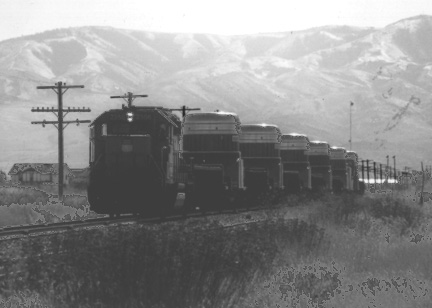
|
|
An Idaho train carries nuclear material. The Snake River Alliance, in a leaked document, was listed as a security threat by the Idaho National Guard because of its anti-nuclear watch-dog activities.
|
The Snake River Alliance is a grassroots, Idaho-based group that monitors the Idaho Nuclear Engineering Environment Laboratory (INEEL), located in eastern Idaho. In the early 1980s, their research uncovered evidence that INEEL allowed nuclear waste to seep into the Snake River Plain Aquifer.

|
|
An Idaho train carries nuclear material. The Snake River Alliance, in a leaked document, was listed as a security threat by the Idaho National Guard because of its anti-nuclear watch-dog activities.
|
But who found the Alliance's activities threatening? To find out, Allister sent a Freedom of Information Act (FOIA) request to several governmental agencies and companies, including the Idaho National Guard, which then admitted that it was their document, and sent Allister the complete works. However, said Allister, one-third of the material was blacked out.
Allister is appealing the decision to black out this information. She also sensed that the Idaho National Guard was uncomfortable with the Alliance possessing the document. "It seemed like they felt we had no right to have it." Allister is shocked that the Idaho National Guard would put the Alliance on a security-risk list simply because of their activism. "This is a serious violation of our constitutional rights as citizens to assemble and to speak out."
Big Bucks Owed
Anti-nuke activists aren't the only ones in Idaho feeling a backlash. A dozen activists who protested logging in the Cove/Mallard roadless area in Idaho in 1993 now owe big bucks to the company building the roads there. Last November a jury in Grangeville, Idaho decided that the activists collectively owed Highland Enterprises $1.3 million from losses that the protests allegedly caused. These monetary losses included the time that Highland couldn't operate and damage done to a bulldozer.
Don Blewett, owner of Highland Enterprises, had a list of activists and organizations he believed to be responsible for harming him monetarily. However, the only people actually served with papers were those arrested at various protests in the summer of 1993.
Those served with papers were required to give depositions responding to questions from Blewett's attorney (who was Blewett's brother). The activists began asserting the fifth amendment, which protects a person from incriminating themselves, and refused to answer questions. It would have been favorable to Blewett if the activists (who were scattered throughout the country) had been required to go to Idaho County in person for their depositions. But, the three attorneys representing the activists filed protective orders allowing the accused to give depositions by phone. This was a setback for Blewett.
But twelve people still owe him money: $1.15 million in punitive fines and $150,000 in damages. The jury divided the amount up so that some owed $100,000 each and some only owed $90,000. Then there are those who never responded to being served papers. They owe $233,000 each. Many are filing for bankruptcy, which may help them avoid paying Blewett.
Asked if Blewett is likely to sue activists in the future, Zaleha is thoughtful. "It seems Blewett, etc., thought they would serve people [with court papers] and wouldn't get a response, so an easy victory. But what they got was a pretty rigorous defense."
Natalie Shapiro writes about environmental and social justice issues. She has been involved in the Cove/Mallard campaign since 1993.
 |
 |
 |
 |
 |